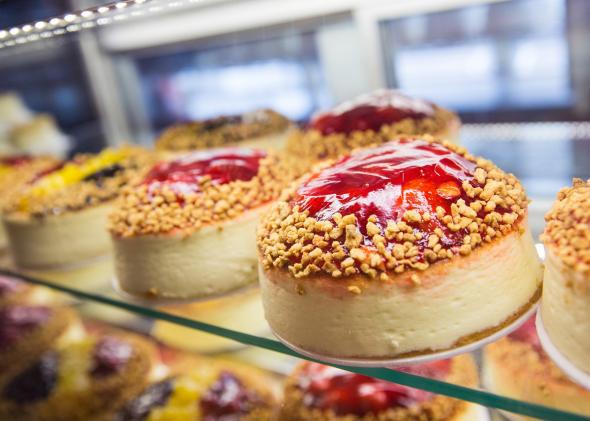A couple of years ago, Evgeny Morozov wrote a spirited defense of the robot-free kitchen, worrying that the machines would destroy creativity in cookery and create “kitchens as exciting as McDonald’s joints.” At the time his concern was merely academic, inspired by efforts to create chef-analyzing computer systems.
Now, though, his concerns are based on reality. PreciBake has started to develop and market artificial intelligence that bakes. The company’s system is integrated into a customer’s ovens, monitors the products in them—breads, cookies, etc.— and learns how they should be properly baked. When it detects discrepancies in the baked goods—too hot, too moist—it can make adjustments. Although the technology is limited to monitoring and controlling the actual baking inside an oven, it is not hard to foresee this technology merging with the systems that concerned Morozov, producing fully integrated kitchen AI.
Every time new technology confronts established art, people worry that the technology will destroy the art. Photography was supposed to kill painting. Theater was declared dead after radio, movies, and television. Some people still wonder if writing can survive the Internet. Similarly, the culinary arts will survive and thrive after AI is widely used.
The more important issues raised by kitchen AI are: 1) the other forms of AI that it suggests, and 2) the legal issues introduced by AI in so many areas of our lives where we have no legal models to address machines that make decisions like people.
On the first topic, AI that cooks could lead to AI that cleans, shops, balances our checkbooks, cares for our children and elderly relatives, and performs many other day-to-day chores. Like cooking, there are many tasks we won’t want to give up. But even the ones we like will be made more enjoyable when we can take a quick break as needed or wanted: “Rosie, please look after Jane and Elroy while I run to the store for five minutes.”
Margaret Boden, a professor of cognitive science at the University of Sussex, calls the potential for AI to create more free time a “rehumanizing” effect. She wrote several decades ago in an article for the International Joint Conference on Artificial Intelligence that AI “can free us not only from drudgery but for humanity.” By relieving us from the responsibility of maintaining the background infrastructure of our lives, AI could give us time to devote to other people, education, service, and the arts, including cooking.
But PreciBake is also a reminder of the unintended legal consequences of AI, as it predicts a time in the near future when similar AI installed throughout the kitchen will learn the recipes you cook and create a new one based on your preferences, an area IBM’s Watson recently explored in an AI food truck. Who owns that recipe? Who is liable for any potentially dangerous allergic reactions caused by that recipe? These concerns may be fairly minimal at home, but in a commercial kitchen they are much more serious.
Under U.S. intellectual property law, only human beings can be authors and inventors. A recipe created by AI, therefore, wouldn’t belong to the person who owns the kitchen. That doesn’t matter in a private home. If my AI blender creates the perfect smoothie, everyone in the world is welcome to share my joy, no charge. But in a commercial kitchen, a recipe can be incredibly valuable. Even if Coca-Cola’s “secret formula” is more marketing stunt than intellectual property right, Coke’s position that it owns the formula and no one else can have it would be much weaker if a computer had created the recipe and it belonged in the public domain.
Similarly, before making dinner for friends and family, a private host likely knows guests’ food allergies and diets. Monitoring the family kitchen AI for troublesome ingredients is not much different than checking the recipe before preparing your own feast.
But meals and food coming out of commercial kitchens have a much greater chance of causing an allergic reaction, with potentially dangerous results. Who bears the liability when these incidents are caused by artificial intelligence is an open question. Did the restaurant fail to monitor the AI properly? Did the AI operate appropriately in the restaurant? AI manufacturers and their customers will need to draft user agreements carefully to make sure indemnification, insurance, and liability issues are addressed directly. Victims will want to review carefully those agreements following any accident that is serious enough to warrant a law suit.
So don’t worry about baking AI resulting in cookie-cutter cookie recipes. AI in the kitchen can free us to experiment with ingredients, techniques, and styles while it prepares the boring meals for us—school lunches, quick breakfasts before work, etc. After AI enters the kitchen, the bigger question is not what will happen to the culinary arts, but what will happen to the law.
